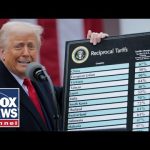President Donald Trump’s new tariffs on imported beef have drawn strong support from American cattle ranchers like fifth-generation Illinois rancher Steve Lucie, who sees the policy as a long-overdue correction to unfair trade practices. Lucie argues the tariffs will help level the playing field for U.S. producers who’ve faced protectionist barriers abroad for decades.
Lucie highlights that countries like Australia sold $29 billion worth of beef to America last year while blocking U.S. exports through restrictive tariffs and non-tariff barriers. Trump’s 10% baseline tariff and higher reciprocal rates aim to pressure trading partners to drop these lopsided arrangements. The National Cattlemen’s Beef Association praises the move, noting Australia, Vietnam, Thailand, and the EU have long used “tariff and non-tariff trade barriers” to limit American beef exports.
Despite short-term market fluctuations, Lucie remains bullish about U.S. beef’s global competitiveness: “We have the highest quality beef in the world…if we have fair trade, that will eventually come back to us.” He emphasizes ranchers’ resilience, stating they’ll “keep doing what we’re doing” regardless of temporary volatility. This sentiment echoes ranchers like Alan Adams, who sees tariffs as a chance to expand herds if export markets open.
The White House frames the tariffs as reclaiming economic independence, citing a $1.2 trillion goods trade deficit and foreign practices like Argentina’s 23-year ban on U.S. cattle imports. By incentivizing domestic production, the administration aims to reverse the offshoring of manufacturing capacity that weakened critical supply chains.
While critics warn of consumer price hikes and supply chain strain, supporters argue the short-term pain is justified to rebuild a self-reliant agricultural base. As Lucie puts it: “This doesn’t bother us…we deal with commodity price fluctuation every day.” The administration bets that fairer trade terms will ultimately strengthen America’s food security and rural economies.




